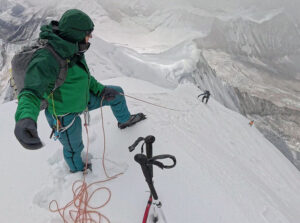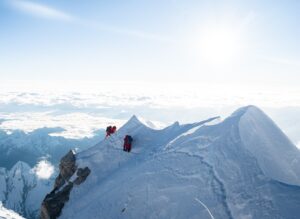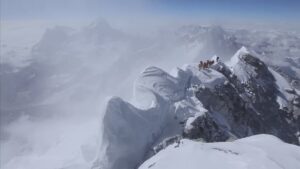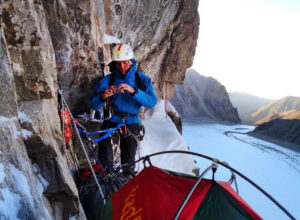Last fall, when Adriana Brownlee summited Dhaulagiri in a 32-hour push from Camp 2 to summit and back to Base Camp, she thought she had survived her hardest mountain experience. Nanga Parbat has changed that. Summiting was quite straightforward, but her descent was hell.
This time the problem was not a storm, quite the opposite, the weather was too good. “The mountain was a melting pot, a vertical river pretty much,” she posted on social media. High temperatures caused constant rockfall, some chunks the size of a person. Water streamed down the mountain and caused the snow anchors on the fixed ropes to come loose. Without the proper anchors, the ropes became too tight to let climbers rappel down.
There was a time when climbers longed for sunny, warmer days. Now, this sort of weather can be scary.
Hot Karakorum
Carlos Garranzo broke an ankle during the trek to K2 and was not able to see the mountain, but he was shocked at the state of the Baltoro glacier. “I couldn’t recognize what I saw, although I have been there several times…there is now an inner lake in the glacier that was not there last year,” he said. “We are destroying our planet.”
Garranzo also shared two pictures of Broad Peak, shot by Sol Castro, showing how dry Broad Peak looks this year compared to 2019. You can see the photos below.

Broad Peak in 2019 and 2022, on the same day and from nearly the same point. Photo: Sol Castro
At the head of the glacier, on K2 and Broad Peak, it is windy today but the days have been remarkably warm.
“So far it’s been sunny and incredibly hot,” Stefi Troguet told ExplorersWeb from near K2 Base Camp (there is an intermittent connection at the Gilkey Memorial). “Forecasts suggest winds and snow in the next few days, but there are differences between them; let’s see how the situation evolves.”
The Marmolada tragedy
The effects of climate change are especially harsh on fragile mountain ecosystems. Climbers and scientists are increasingly referencing that the “point of no return” is approaching. But the consequences are already here.
The latest tragedy occurred yesterday on Marmolada peak, one of the most popular spots in the Italian Alps. A serac fall killed at least six people, injured at least eight more, and left an unknown number of climbers missing.
Rescue labors continue today, but 16 cars are still in the parking lot. “The number of victims could double, even triple,” District Attorney Sandro Raimondi told the media. “Moreover, a DNA test will be needed to identify the victims recovered so far,” he added.
The serac collapsed at 2 pm yesterday and the debris, mainly chunks of ice, water, and rocks, swept the normal route in a 300m wide front. Some climbers were on their way up, others were on descent. There is little hope of finding anyone alive under the avalanche.
Incredible footage from an helicopter of the mountain rescue of the basal detachment in Marmolada.
Water lubrication at the base (or interstrata) and increased pressure in water-filled crevasses are probably the main causes for this catastrophic event pic.twitter.com/2OXRExkdjy
— Alpine-Adriatic Meteorological Society (@aametsoc) July 3, 2022
Italy’s national mountain rescue patrols (Corpo Nazionale Soccorso Alpino e Speleologico – CNSAS) have warned that the entire area of the Marmolada massif has been evacuated and access to the area is forbidden because of the risk of further ice falls. They have put up a phone number for families and friends of climbers who could have been in the area and whose whereabouts remain unknown: +39 0461 495272. Please do not use that number for any other kind of information.
Some days ago, we reported that other alpine peaks are becoming riskier because of a lack of snow, such as Mont Blanc. On Everest, Base Camp could be moved down the glacier.
A few climbers have been voicing their concerns.
“It’s far too hot,” Reinhold Messner told media yesterday. “Permafrost is disappearing and the resulting water forms real rivers under the glaciers that, eventually, flow down and sweep everything along.”
Carla Perez, back at home in the Ecuadorian Andes after summiting Makalu without O2: “This year I have seen, as never before, the destruction and imbalance on glaciers, rivers, seas, and mountains,” she wrote.
Sadly, it seems that we will be reporting on this kind of news more often in the near future.






